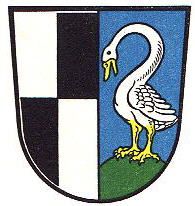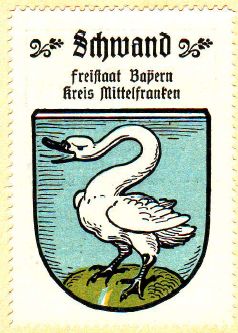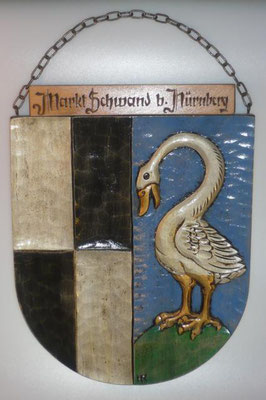Schwand: Difference between revisions
Knorrepoes (talk | contribs) m (Text replacement - "|center]] ====Official blazon====" to "|center|Wappen von {{PAGENAME}}]] ====Official blazon====") |
Knorrepoes (talk | contribs) m (Text replacement - "↵↵'''" to "'''") |
||
| (22 intermediate revisions by the same user not shown) | |||
| Line 1: | Line 1: | ||
'''SCHWAND''' | '''SCHWAND''' | ||
| Line 6: | Line 5: | ||
Incorporated into : 1978 [[Schwanstetten]] | Incorporated into : 1978 [[Schwanstetten]] | ||
[[File:schwand1.jpg|center|Wappen von {{PAGENAME}}]] | [[File:schwand1.jpg|center|alt=Wappen von {{PAGENAME}}/Arms (crest) of {{PAGENAME}}]] | ||
= | {| class="wikitable" | ||
|+Official blazon | |||
|- | |||
|'''German''' | |||
| blazon wanted | |||
|- | |||
|'''English''' | |||
| blazon wanted | |||
|} | |||
===Origin/meaning=== | |||
The oldest known seal of the city dates from the early 15<sup>th</sup> century and already shows the above arms. The quartered shield is the arms of the Hohenzollern dynasty, as they owned the city at the time. The swan is a canting element (Schwan=swan). The swan appeared as a single symbol on a seal from 1652, and again in the early 19<sup>th</sup> century, when the city became a part of Bayern and thus all references to old dynasties and states became politically unacceptable. In 1933 the historical arms were officially restored and granted. | The oldest known seal of the city dates from the early 15<sup>th</sup> century and already shows the above arms. The quartered shield is the arms of the Hohenzollern dynasty, as they owned the city at the time. The swan is a canting element (Schwan=swan). The swan appeared as a single symbol on a seal from 1652, and again in the early 19<sup>th</sup> century, when the city became a part of Bayern and thus all references to old dynasties and states became politically unacceptable. In 1933 the historical arms were officially restored and granted. | ||
{|align="center" | {|align="center" | ||
|align="center"|[[File:schwand.hagd.jpg|center]] <br/>The arms by [[Otto Hupp|Hupp]] in the [[Kaffee Hag albums]] +/- 1925 | |align="center"|[[File:schwand.hagd.jpg|center|Wappen von {{PAGENAME}}/Coat of arms (crest) of {{PAGENAME}}]] <br/>The arms by [[Otto Hupp|Hupp]] in the [[Kaffee Hag albums]] +/- 1925 | ||
|align="center"|[[File:{{PAGENAME}}-mus.jpg|center|Wappen von {{PAGENAME}}/Coat of arms (crest) of {{PAGENAME}}]] <br/>The arms in the [https://www.deutsches-wappen-museum.de/ Deutsches Wappenmuseum] | |||
|} | |} | ||
{{de}} | |||
{{media}} | {{media}} | ||
[[Literature]] : Stadler, 1964-1971, 8 volumes; Hupp, O: [[Kaffee Hag albums]], 1920s | [[Civic Heraldry Literature - Germany|'''Literature''']]: Stadler, 1964-1971, 8 volumes; Hupp, O: [[Kaffee Hag albums]], 1920s | ||
[[Category:German Municipalities S]] | [[Category:German Municipalities S]] | ||
Latest revision as of 14:53, 7 January 2024
SCHWAND
State : Bayern
District (Kreis) : Roth (until 1973 Schwabach)
Incorporated into : 1978 Schwanstetten
| German | blazon wanted |
| English | blazon wanted |
Origin/meaning
The oldest known seal of the city dates from the early 15th century and already shows the above arms. The quartered shield is the arms of the Hohenzollern dynasty, as they owned the city at the time. The swan is a canting element (Schwan=swan). The swan appeared as a single symbol on a seal from 1652, and again in the early 19th century, when the city became a part of Bayern and thus all references to old dynasties and states became politically unacceptable. In 1933 the historical arms were officially restored and granted.
| The arms by Hupp in the Kaffee Hag albums +/- 1925 |
The arms in the Deutsches Wappenmuseum |
This page is part of the German heraldry portal |
Heraldry of the World |
|
German heraldry:
|
Selected collector's items from Germany:
|
Contact and Support
Partners:
Your logo here ?
Contact us
© since 1995, Heraldry of the World, Ralf Hartemink 
Index of the site
Literature: Stadler, 1964-1971, 8 volumes; Hupp, O: Kaffee Hag albums, 1920s














